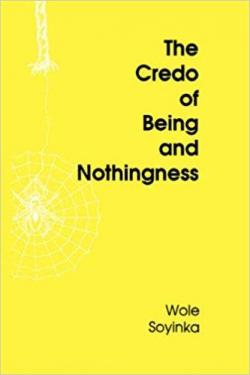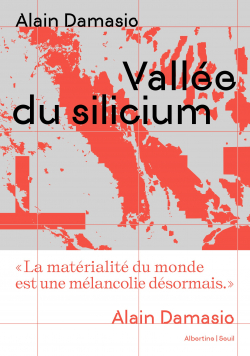
Wole Soyinka/5
1 notes
Résumé :
Court essai du prix Nobel de littérature nigérian Wole Soyinka, résumant sa vision des religions. Il y renvoie dos à dos les différents monothéismes, condamnant leur prosélytisme, leur intolérance et leur soif de violence et de destruction à l'encontre des "incroyants" et "hérétiques". A leur place, il prône un réexamen des spiritualités africaines, dont la structure polythéiste et la forme initiatique et personnelle que prend la conversion assurent une plus grande ... >Voir plus
étiquettes
Ajouter des étiquettes
Que lire après The Credo of Being and NothingnessVoir plus
Citations et extraits (6)
Voir plus
Ajouter une citation
Violence appears to be the one constant in the histories of all the major religions of the world – a primitive aggressiveness, violence – despite the lip-service which their tenets pay to the need for tolerance, peace and understanding. We are concerned here with the practice, the manifested presences of these religions, not the scriptures which we know can both condemn and extol holy hostility towards non-believers within the same chapter. Even today, as we approach the end of the twentieth century, a century in which man has broken almost all the frontiers of the universe and put Nature to task in its preeminence over phenomonological ordering, yes, even today, we need only pick up any journal or tune in the radio or television to any corner of the world, and you may depend upon it – a new inhuman act, some new destructive conflict is certain to have surfaced somewhere, one that is traceable to one or other of the so-called major religions. It is time that these religions took stock of themselves, re-examined their social tendencies in the light of a constantly evolving world and resolve to transcend their violent histories. This act of re-examination will however remain incomplete if it is wholly self-centred.
By this I mean that it is not enough to examine their own course in world history but to equally re-examine the very nature of other beliefs with which they have interacted in their passage through history, including those which they do not accept as religions.We are referring here, to put it mildly, to the reality of structured ignorance – not merely intolerance – but ignorance and misconceptions of other systems of beliefs whether as philosophies, religions or world-views. Even when some of these religions – such as christianity, islam, etc. have been affected, or infected by aspects of other beliefs and religious practices, it is my contention that such religions have failed to grasp the essence of those other faiths which now constitute ''impurities'' within their own spiritual blood-stream. They prefer to persecute manifestations of these realities, to excommunicate or indeed exterminate them, thereby depriving themselves of the most rudimentary knowledge of the other. Not that they ever read this attitude as one of deprivation, on the contrary. You cannot deprive yourself of the knowledge of what does not exist. It is always far far simpler to proceed along the Gumistic dictum: the other is nothing. Nothing is there. Whatever appeared to be there is mere appearance, a Satan-induced illusion, a nothing-being.
By this I mean that it is not enough to examine their own course in world history but to equally re-examine the very nature of other beliefs with which they have interacted in their passage through history, including those which they do not accept as religions.We are referring here, to put it mildly, to the reality of structured ignorance – not merely intolerance – but ignorance and misconceptions of other systems of beliefs whether as philosophies, religions or world-views. Even when some of these religions – such as christianity, islam, etc. have been affected, or infected by aspects of other beliefs and religious practices, it is my contention that such religions have failed to grasp the essence of those other faiths which now constitute ''impurities'' within their own spiritual blood-stream. They prefer to persecute manifestations of these realities, to excommunicate or indeed exterminate them, thereby depriving themselves of the most rudimentary knowledge of the other. Not that they ever read this attitude as one of deprivation, on the contrary. You cannot deprive yourself of the knowledge of what does not exist. It is always far far simpler to proceed along the Gumistic dictum: the other is nothing. Nothing is there. Whatever appeared to be there is mere appearance, a Satan-induced illusion, a nothing-being.
There is hardly one religion in the world which fails to extol godhead as truth, or beauty. God is truth, we are consistently reminded. God is truth; God is beauty. Well, then, if these properties of godhead are universally acknowledged, can we not then simply agree among ourselves that wherever we find truth, then an element of godhead is present? That where there is beauty, and wisdom, there indeed exist aspects of godhead? We need not go so far as to conclude that wherever we find truth, wisdom and beauty there also exists godhead, no. For the sake of present argument, it will be sufficient to accept that wherever we find truth, wisdom and beauty in their purest essence, we have indeed glimpsed fundamental attributes of godhead. After all, religion itself preaches and illustrates this goal of human striving, urges mankind to approach, emulate or be worthy of godhead by assimilating and demonstrating these qualities in secular activities, in social relationships and in the manifest creativity of the human mind. The architecture of various religious tempers, separated in time and space, are evident attempts to capture the immanence of godhead in secular but creative language, arbitrated by the cultural idioms of various human communities.
If therefore, we, as sentient beings, can respond with a sense of elevation to the enduring islamic architecture of a Suleiman the Magnificent, to the flaring Gothic cathedrals of the European mediev al churches, to the Dorian temples of the Greek pantheon, the ornate temples of Anghor Wat in Cambodia, the ancient shinto temples of Japan, the extravagant hindu temples which litter the Asian continent, the caryatid studded shrines of African orisa whose profoundest creative responses to the mysteries of godhead ae scattered all over the museums of the world and in numerous private collections... we merely respond to essences of the ideal of beauty which becomes elevated to the status of godhead.
If therefore, we, as sentient beings, can respond with a sense of elevation to the enduring islamic architecture of a Suleiman the Magnificent, to the flaring Gothic cathedrals of the European mediev al churches, to the Dorian temples of the Greek pantheon, the ornate temples of Anghor Wat in Cambodia, the ancient shinto temples of Japan, the extravagant hindu temples which litter the Asian continent, the caryatid studded shrines of African orisa whose profoundest creative responses to the mysteries of godhead ae scattered all over the museums of the world and in numerous private collections... we merely respond to essences of the ideal of beauty which becomes elevated to the status of godhead.
The ungodly in any religious conception, are not therefore those who respond to the commonality of the intuition of godhead in a way different from ours, but those who set about the destruction of its manifestations whose idioms they do not understand. The Khymer Rouge in Cambodia, for instance, acted as barbarians, as no better than mean-spirited thugs in their conduct towards the spiritual treasures of Cambodia. We need not be hindus to recognise this, and to dub the Khymer Rouge ungodly iconoclasts for their ''pogrom'' of the hindu gods. Similarly both christian and moslem invaders on the African continent share the inglorious responsbility for their pogrom of Africa's spiritual heritage. And we must call attention here to a singularly blasphemous contestation between these two, one which is long overdue for terminal dismissal: this blasphemy is summed up in the proposition, so well beloved of their proselytisers, that one or the other of these two religions is obviously indigenous to the continent, while the other is alien, or foreign. Indigenous? Indeed! It is a purely self-serving rhetoricism which belongs in the same school of ''reasoning'' that claims that Arab enslavement of Africans was more humane than European enslavement, or vice versa.
For the rest, I wish only to exhort you: study the spirituality of this continent. As in all things, selectiveness is the key. To limit myself to that with which I am on familiar grounds, I say to you: go to the orisa, learn from them and be wise. The religion of the orisa does not permit in tenet, liturgy, catechism or practice, that pernicious dictum: ''I believe, therefore, I am.'' Nowhere will you find the sheerest skein of reasoning in that direction to human self-apprehension. Obviously, therefore, you will not find its corollary: ''You do not believe, therefore you are not.'' Orunmila does not permit it. Obatala cannot conceive of it. Ogun will take up arms against it. Not one Odu of Ifa so much as suggests it. It is not weakness in the character of this religion, however, it is not even tolerance. It is simply – understanding. Wisdom. An intuitive grasp of the complexity of the human mind, and a true sense of the infinite potential of the universe.
We must request that this gratuitous justification of any form of imperialism – spiritual, political or cultural – be restricted to the privileged circles of those whose ancestors were the slave raiders and merchants; it should not be uttered within earshot of those who are yet surrounded by the evidence of their historic dehumanisation.
Videos de Wole Soyinka (20)
Voir plusAjouter une vidéo
Wole Soyinka – Un siècle d'écrivains (France 3, 1996)
L'émission « Un siècle d'écrivains », numéro 60, diffusée sur France 3, le 21 février 1996, et réalisée par Abdelkrim Djaad et Ahmed Rachedi.
Les plus populaires : Non-fiction
Voir plus
Livres les plus populaires de la semaine
Voir plus
Les Dernières Actualités
Voir plus
Autres livres de Wole Soyinka (28)
Voir plus
Quiz
Voir plus
Jésus qui est-il ?
Jésus était-il vraiment Juif ?
Oui
Non
Plutôt Zen
Catholique
10 questions
1833 lecteurs ont répondu
Thèmes :
christianisme
, religion
, bibleCréer un quiz sur ce livre1833 lecteurs ont répondu







































